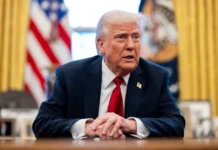Clearly realizing, or having been told by advisers, that he’d crossed a line in his Zoom speech to the Knesset on Sunday evening, Ukrainian President Volodymyr Zelensky subsequently softened his tone. In a video message on Telegram several hours later, he said, “Of course, Israel has its interests—strategy—to protect its citizens. We understand all of it. The prime minister of Israel, Mr. [Naftali] Bennett, is trying to find a way of holding talks, and we are grateful for this. We are grateful for his efforts, so that sooner or later we will begin to have talks with Russia, possibly in Jerusalem. That’s the right place to find peace, if possible.”
It is this sentiment that he should have conveyed while calling on Israel’s lawmakers for help. Instead, the leader who is being hailed by much of the world as a heroic David fending off an evil Goliath not only chastised the Jewish state; he totally distorted Holocaust history in the process.
This was his way of tailoring his remarks to the audience, as he had done when speaking to the British Parliament on March 9, the Canadian Parliament on March 15, the U.S. Congress on March 16 and the German Bundestag on March 17. In each case, he cited examples with which the politicians and public could relate. And though his pleas for military aid included criticism that not more is being done to come to Ukraine’s rescue, they also contained clauses of gratitude. His admonitions to Israel, on the other hand, were unequivocal.
Israelis thought at first that his Golda quote was leading to an analogy about a small state coming under attack by enemy armies. Yet Zelensky wasn’t referring to Israel’s Independence War, Six-Day War or Yom Kippur War; nor was he talking about its defensive battles against Iran-backed Hezbollah in Lebanon or Hamas in Gaza—not to mention ongoing Palestinian terrorism in Judea, Samaria and eastern Jerusalem.
“This Russian invasion of Ukraine is not just a military operation as Moscow claims. This is a large-scale and treacherous war aimed at destroying our people; destroying our children; our families; our state; our cities; our communities,” he said. “That is why I have the right to make this parallel and this comparison. Our history and your history. Our war for our survival and World War II.”
If this had been the extent of his inapt juxtaposition, it wouldn’t have been so bad. It was the following slew of inaccuracies that he spewed in order to call Israel to task that caused ill ease among some Israelis and outright rage among others.
Let’s start with his reiteration of a false report that the Russian missiles hit the Babyn Yar Holocaust memorial. The story, which was published by news outlets everywhere, was revealed to be untrue by veteran Israeli journalist Ron Ben-Yishai, who visited the site and discovered that it hadn’t been damaged at all.
Again, if this error had slipped in by accident, it would have been a simple blunder. But it had a purpose, as Zelensky indicated.
“I am sure that every word of my address echoes with pain in your hearts because you feel what I’m talking about,” he asserted.
And then he let loose. “But can you explain why we still turn to the whole world, to many countries for help? We ask you for help, even for basic visas. What is it? Indifference? Premeditation? Or mediation without choosing a party? I will leave you a choice of answers to this question. And I will note only one thing: Indifference kills. Premeditation is often erroneous. And mediation can be between states, not between good and evil.”
There it was—an open attack on Bennett for taking on the role of liaison between Kyiv and the Kremlin. And then he went further. After pointing to Israel’s superior missile-defense capabilities, he lashed out: “One can keep asking why we can’t get weapons from you. Or why Israel has not imposed strong sanctions against Russia. Why it doesn’t put pressure on Russian business. … It is up to you, dear brothers and sisters, to choose the answer. And you will have to live with this answer, people of Israel.”
His conclusion was even worse.
“Ukrainians have made their choice,” he announced. “Eighty years ago, they rescued Jews. That is why the Righteous Among the Nations are among us. People of Israel, now you have such a choice.”
According to a Talmudic interpretation of the book of Job, “a person is not held responsible for what he says when he is in distress.”
This morsel of Jewish wisdom has been repeated in various forms by Israelis across the political spectrum in relation to Zelensky. It’s understandable, given the brutality with which his people are being treated by Russian President Vladimir Putin.
The trouble is that other than far too few exceptions, Ukrainians perpetrated pogroms on Jews and participated in their slaughter during the Holocaust. This isn’t to say that Ukrainians are Nazis, as Putin keeps insisting. Nor does Israel consider them as such.
Yet it’s hard not to fume at Zelenky’s perversion of the facts and his objective in presenting them in the way that he did. Indeed, as terrible a situation as Ukraine is in right now, it does not even remotely resemble the Holocaust. To suggest otherwise is nothing short of immoral.
Even more disturbing was his manipulation of the past in order to make Israel feel guilty. To do so while thousands were gathered at Tel Aviv’s Habima Square to watch and cheer his performance on a big screen—and with planeloads of supplies and volunteers leaving Ben-Gurion International Airport daily for Ukraine, along with equipment and medical personnel for the establishment of a full-fledged field hospital—was not merely unjust; it illustrated a combination of ignorance and willful blindness.
Neither his reproach nor his apologetic afterthought will affect Israeli policy towards Ukraine or public support for its leader. His halo, however, is no longer shining so brightly.
Ruthie Blum is an Israel-based journalist and author of “To Hell in a Handbasket: Carter, Obama, and the ‘Arab Spring.’ ”


























